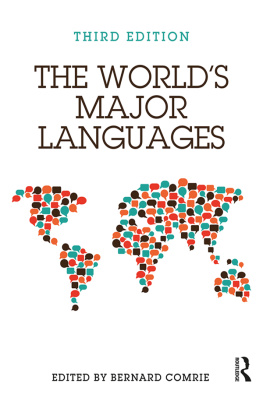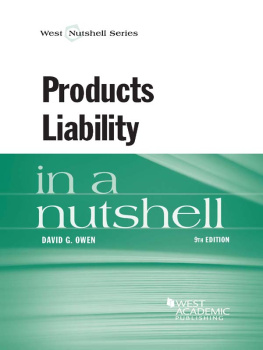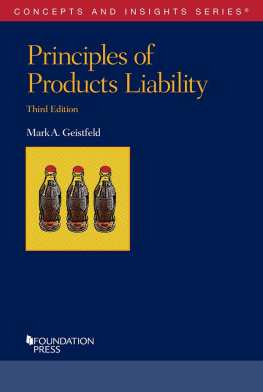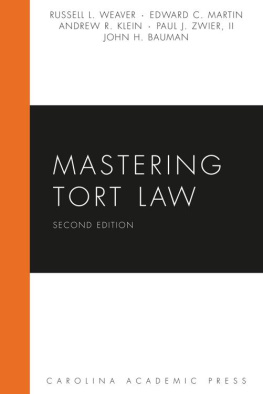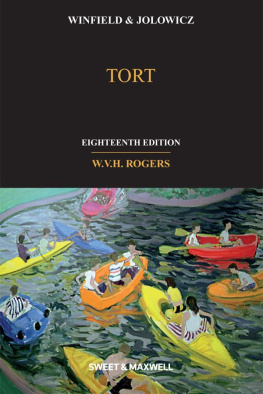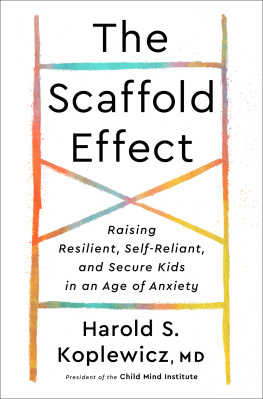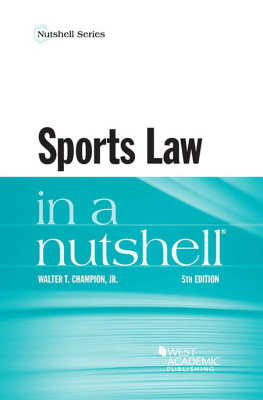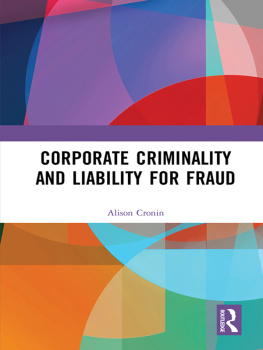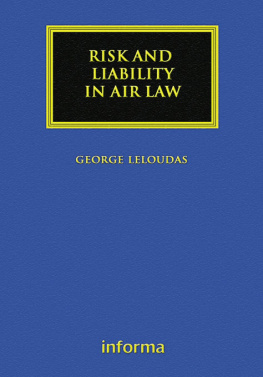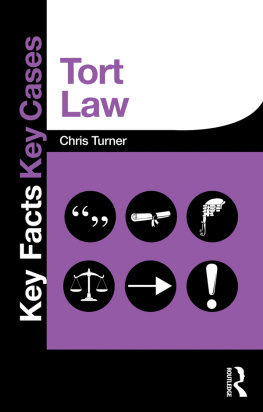Harold Potter - The principles of liability in tort.
Here you can read online Harold Potter - The principles of liability in tort. full text of the book (entire story) in english for free. Download pdf and epub, get meaning, cover and reviews about this ebook. year: 1948, publisher: Sweet & Maxwell, genre: Home and family. Description of the work, (preface) as well as reviews are available. Best literature library LitArk.com created for fans of good reading and offers a wide selection of genres:
Romance novel
Science fiction
Adventure
Detective
Science
History
Home and family
Prose
Art
Politics
Computer
Non-fiction
Religion
Business
Children
Humor
Choose a favorite category and find really read worthwhile books. Enjoy immersion in the world of imagination, feel the emotions of the characters or learn something new for yourself, make an fascinating discovery.
- Book:The principles of liability in tort.
- Author:
- Publisher:Sweet & Maxwell
- Genre:
- Year:1948
- Rating:4 / 5
- Favourites:Add to favourites
- Your mark:
- 80
- 1
- 2
- 3
- 4
- 5
The principles of liability in tort.: summary, description and annotation
We offer to read an annotation, description, summary or preface (depends on what the author of the book "The principles of liability in tort." wrote himself). If you haven't found the necessary information about the book — write in the comments, we will try to find it.
The principles of liability in tort. — read online for free the complete book (whole text) full work
Below is the text of the book, divided by pages. System saving the place of the last page read, allows you to conveniently read the book "The principles of liability in tort." online for free, without having to search again every time where you left off. Put a bookmark, and you can go to the page where you finished reading at any time.
Font size:
Interval:
Bookmark:
Third edition published 2018
by Routledge
2 Park Square, Milton Park, Abingdon, Oxon, OX14 4RN
and by Routledge
711 Third Avenue, New York, NY 10017
Routledge is an imprint of the Taylor & Francis Group, an informa business
2018 selection and editorial matter, Bernard Comrie; individual chapters, the contributors
The right of Bernard Comrie to be identified as the author of the editorial material, and of the authors for their individual chapters, has been asserted in accordance with sections 77 and 78 of the Copyright, Designs and Patents Act 1988.
All rights reserved. No part of this book may be reprinted or reproduced or utilised in any form or by any electronic, mechanical, or other means, now known or hereafter invented, including photocopying and recording, or in any information storage or retrieval system, without permission in writing from the publishers.
Trademark notice: Product or corporate names may be trademarks or registered trademarks, and are used only for identification and explanation without intent to infringe.
First edition published by Croom Helm 1987
Second edition published by Routledge 2009
British Library Cataloguing-in-Publication Data
A catalogue record for this book is available from the British Library
Library of Congress Cataloging-in-Publication Data
Names: Comrie, Bernard, 1947- editor.
Title: The worlds major languages / edited by Bernard Comrie.
Description: Third edition. | Milton Park, Abingdon, Oxon ; New York,
NY : Routledge, [2018] | First edition published by Croom Helm 1987. |
Includes bibliographical references and index.
Identifiers: LCCN 2017039531| ISBN 9781138184824
(hardback : alk. paper) | ISBN 9781315644936 (ebook)
Subjects: LCSH: Language and languages.
Classification: LCC P371 .W6 2018 | DDC 410dc23
LC record available at https://lccn.loc.gov/2017039531
ISBN: 978-1-138-18482-4 (hbk)
ISBN: 978-1-315-64493-6 (ebk)
Typeset in Times New Roman and Helvetica
by Apex CoVantage, LLC

In the preface to the first edition of this work, published in 1987, I noted that it represented the fruits of the collaboration of 44 scholars with international reputations ranging across a broad spectrum of the worlds languages. The second edition added two new languages (Javanese and Amharic) and these two authors plus another eight who either substantially revised or completely rewrote existing chapters, but lost two first edition authors, increasing the number of contributors to 52. It contained 52 chapters, each dealing with a single language, group of languages, or language family, in addition to my Introduction. The chapters that were not completely new were revised, at times substantially, from their original version published in 1987, although in 19 chapters this was restricted primarily to my updating the bibliography. The present third edition is for the most part a light revision of the second, updating bibliographies and making other essential corrections, although different authors have changed their texts to somewhat varying degrees. Even this light revision involved securing the collaboration of 19 new authors, so that the third edition reflects overall the input of 72 scholars (including both the 70 listed contributors to this edition and two who contributed only to the first edition) over three decades.
Perhaps the most controversial problem that I, as editor, have continued to face in the third edition has been the choice of languages to be included. My main criterion has, admittedly, been a very subjective one: what languages do I think the volumes readership would expect to find included? In answering this question I have, of course, been guided by more objective criteria, such as the number of speakers of individual languages, whether they are official languages of independent states, whether they are widely used in more than one country, whether they are the bearers of long-standing literary traditions. These criteria often conflict thus Latin, though long since deprived of native speakers, is included because of its immense cultural importance and I bear full responsibility, as editor, for the final choice. I acknowledge that the criterion of readership expectation has led me to bias the choice of languages in favour of European languages, although over half of the volume is devoted to languages spoken outside Europe.
The notion of major language is obviously primarily a social characterisation, and the fact that a language is not included in this volume implies no denigration of its importance as a language in its own right: every human language is a manifestation of our species linguistic faculty and any human language may provide an important contribution to our understanding of Language as a general phenomenon. In the recent development of general linguistics, important contributions have come from the Australian Aboriginal languages Warlpiri and Dyirbal. My own research work has concentrated largely on languages that do not figure in this volume, such as Chukchi of eastern Siberia, Huichol of Mexico, Maltese of the Mediterranean, Haruai of the New Guinea Highlands and Tsez and Bezhta of the North Caucasus. Other editors might well have come up with different selections of languages, or have used somewhat different criteria. When linguists learned of the death in 1989 of the last speaker of Kamas, a Uralic language originally spoken in Siberia, who had kept her language alive for decades in her prayers God being the only other speaker of her language they may well have wondered whether, for Klavdija Plotnikova, the worlds major language was not Kamas.
Contributors were presented with early versions of my own chapters on Slavonic languages and Russian as models for their contributions, but I felt it inappropriate to lay down strict guidelines as to how each individual chapter should be written, although I did ask authors to include at least some material on both the structure of their language and its social background. The main criterion that I asked contributors to follow was: tell the reader what you consider to be the most interesting facts about your language. This has necessarily meant that different chapters highlight different phenomena (e.g. the chapter on English highlights the role of English as a world language; the chapter on Arabic, the writing system; the chapter on Turkish, the grammatical system). But I believe that this variety has lent strength to the volume, since within the space limitations of what has already grown to be quite a sizeable book it would have been impossible to do justice in a more comprehensive and homogeneous way to each of over 50 languages and language families.
The original impetus for the first edition, published by Croom Helm (since merged into Routledge/Taylor & Francis), came from a meeting with Jonathan Price, at that time the publishers Linguistics Editor, who also worked with me editorially on the first edition and earned my eternal gratitude. This role was taken on for the second edition by Kate Aker, Director of Development at Routledge Reference, whom I thank not only for her editorial work but also for her patience during delays that were wished upon her. I would also like to thank Ulrike Swientek for her sterling efforts during the production phase. In-house editorial oversight for the third edition was exercised by Samantha Vale Noya, Camille Burns and Ruth Berry, whose guidance ensured timely and successful completion of the project.
Some of the authors who contributed to the first edition have since passed on: Robert Austerlitz, R.G.G. Coleman, Einar Haugen, Robert Hetzron, Yamuna Kachru, Alan S. Kaye, Jan G. Kooij, D.N. MacKenzie, nh-Ho Nguyn and D.J. (Jack) Prentice. I dedicate this third edition to their memory.
Font size:
Interval:
Bookmark:
Similar books «The principles of liability in tort.»
Look at similar books to The principles of liability in tort.. We have selected literature similar in name and meaning in the hope of providing readers with more options to find new, interesting, not yet read works.
Discussion, reviews of the book The principles of liability in tort. and just readers' own opinions. Leave your comments, write what you think about the work, its meaning or the main characters. Specify what exactly you liked and what you didn't like, and why you think so.

